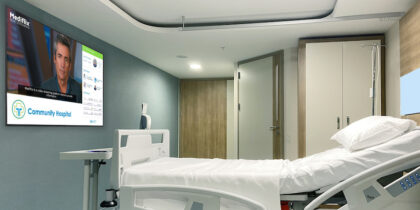Artificial intelligence solutions are poised to change the way hospital visits work.
How many times have you had to repeatedly answer the same questions during a hospital visit and wondered — Why aren’t they sharing this information? What if I answer the same question different ways? Is this a test to see if I’m telling the truth? Is anyone writing this down?
AI, voice-enabled solutions in particular, are bringing hope to every patient and clinician looking for a more streamlined, productive process by cutting back on the need for human involvement and instead using a mix of technologies to look across patients’ medical records, health histories and other personalized information. The result is better, more individualized healthcare decisions.
How AI Voice Solutions Improve Healthcare Processes
AI-enabled solutions like those from Nuance Communications have been the talk of recent industry conferences, largely because of the big boosts in hospital productivity that they bring providers. Nuance’s Dragon Medical One boasts improvements including:
- Enhanced responsiveness
- A 30 percent drop in errors
- Forty-five percent savings in clinician documentation times
- A 36 percent bump in quality scores
The CAPD (computer-assisted physician documentation) solution is complex but straightforward — clinical data is pulled from the cloud, and algorithms, in turn, learn patterns and use evidence to ask physicians the ideal question at the optimal time. All of this happens at speeds that are largely unseen in today’s healthcare environments.
Revolutionize the Patient Experience
See how innovative hospitals are using digital technology to keep patients happy and healthy. Download Now
If this sounds familiar, it should. Many consumer-level artificial intelligence solutions, such as Samsung’s Bixby, feature similar voice-enabled capabilities like pattern recognition, seamless communication and the ability to get smarter over time. In a healthcare setting, this same family of technology serves as the foundation for solutions such as virtual scribes that help reduce physician burnout, and virtual assistants, which listen to physicians, interpret their orders and foresee their needs.
The Real Challenge of Artificial Intelligence Solutions
Getting the most out of artificial intelligence solutions requires carefully developed standards. Unfortunately, the discussion of AI best practices is just starting to gain inertia, so many leaders will essentially be starting from scratch in their organizations. When creating best practices for individual facilities and care systems, it will be important to keep some recommendations in mind. Here are a few tips to help you get started.
1. Don’t limit yourself to Silicon Valley. Many AI applications will come from tech outsiders who might have industry-specific insight into healthcare challenges. In addition, many individual organizations are already developing their own big data analytics systems using machine learning principles, so in-house innovation shouldn’t be ignored.
2. Start with the lakes — more particularly, data lakes, as they’ve already found a relatively secure home in healthcare. Since, unlike relational databases, these systems don’t have to be structured for a specific use, the applicability extends to much more complex queries and problems.
3. Get your data up to speed. Many providers are still struggling to understand how to connect big data with performing everyday care tasks, choosing the right products and producing clean, timely and accurate information. All’s not lost though, and an immediate focus on developing analytics competencies (especially proper information governance) will serve as a strong foundation for any organization looking to evolve in their use of AI in the future.
Additionally, consider how hospital staff will be accessing this information throughout the day. With the emergence of tablets, wearables and even unlocked smartphones, ITDMs now have more options than ever for what technology they can equip staff with.
Connect with clinical and executive staff, as well as patients: It’s impossible to point the power of AI in the right direction if problems aren’t properly identified. Thankfully, these problems don’t even have to be specific. They can be as simple as a lack of visibility into a substance abuse population, poor revenue cycle performance or drooping metrics on value-based contracts. People will be the in the best position to point these out, providing a starting point for applications.
Maintaining the Human Connection
Somewhat ironically, AI solutions are rising to prominence in healthcare just as the importance of personal, human relationships is being recognized. This puts many decision-makers in a bind, having to balance a departure from disconnected, impersonal care with the implementation of technology.
We’re still, however, quite a bit short of a future where doctors are replaced by robots. Doctors are still very much needed, but AI is emerging as an extremely competent and useful co-pilot. That’s probably for the best, as decision-makers will need time to optimize the human element in their care interactions. This will involve long-term, proactive measurement of both quantitative and qualitative feedback from patients, caregivers and clinicians to judge responses and results from AI initiatives.
As organizations continue to build their artificial intelligence solutions to improve hospital productivity, leaders will want to keep in mind the fact that patient engagement is essentially a moving target, with patient expectations and comfort levels continually being pushed by consumer technology. This will be a challenge for providers, but new developments such as voice-enabled solutions promise a future where both clinicians and patients will likely find little trouble interfacing with technology solutions.
Explore cutting-edge healthcare technology in more depth by checking out our full line of healthcare solutions.








